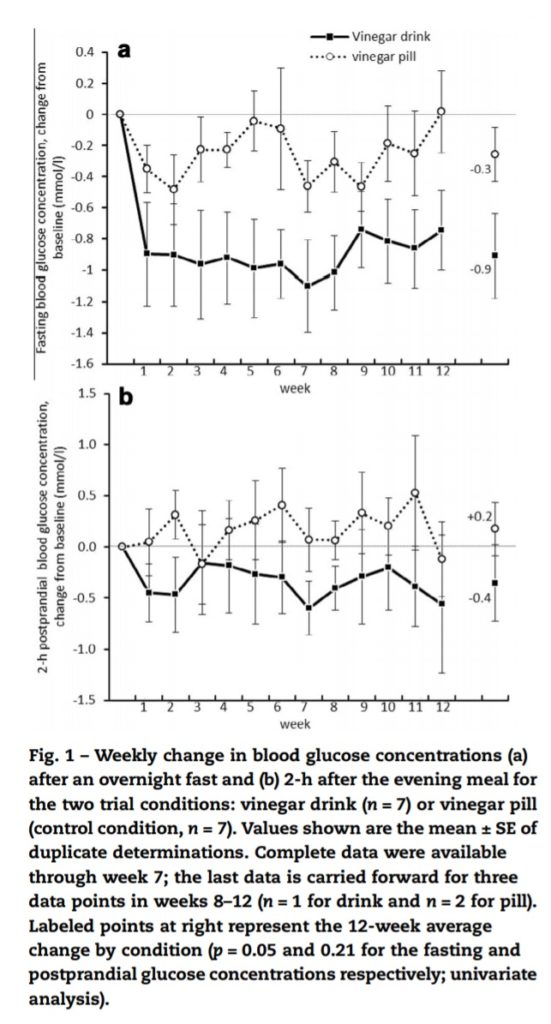
Is there anything truly healthy about good old British fish and chips with plenty of salt and vinegar? Well, yes, there is – although it would probably come as something of a surprise to most people – it’s actually the vinegar (acetic acid). And what’s more, research shows that vinegar is able to help in the prevention of type 2 diabetes (T2D).
Blog Contents
Vinegar study
A 2013 study 1 looked at how strategies to treat prediabetes and the slow progression to type 2 diabetes are urgently and increasingly needed. Their research indicated that by simply making one small dietary change, namely, adding vinegar to meals each day, it was possible to reduce fasting glucose significantly – something of great significance to prevent the risk of developing type 2 diabetes.
And its positive effect occurred within the first week of ‘treatment’ (just adding it to meals), and continued during the whole length of the 12-week study trial with no negative side-effects, unlike anti-diabetic pills.
Additionally, no other eating patterns need to be changed. That is, if you’re still going to eat unhealthily, just adding a tablespoon of vinegar twice a day to your meals will produce the positive effects.
Study design
The 19 healthy individuals selected for this 12 week trial were identified as being either pre-diabetic or as having a fasting blood glucose measure of >5.55 mmol/l at study entry.
They were split into two groups: one given a ‘vinegar pill‘ twice a day with meals, and the other given an apple cider vinegar drink with the two meals.
The apple cider drinks each contained a tablespoon (750 mg) of vinegar, whilst the vinegar pills (Apple Cider Vinegar tablets, General Nutrition Corporation, Pittsburgh, PA) contained only trace amounts of acetic acid (40 mg/tablet) – basically a placebo.

Study results
The average change in fasting glucose differed significantly between groups (0.91 ± 0.27 and 0.26 ± 0.17 mmol/l for the vinegar and control groups respectively). The results are shown in more detail in the charts below.

Study discussion
Previous studies 2 3 4 have suggested that the reasons that acetic acid, the defining ingredient of all vinegars, may have these positive effects is because it is able to:
- interfere with carbohydrate digestion
- promote glucose uptake by muscle
- increase b-cell insulin secretion
This study showed that a single dietary strategy as simple as having regular vinegar (1 tablespoon at mealtime twice daily), can genuinely help in reducing fasting blood glucose concentrations. And, what’s more, this is demonstrably more effective that the standard pharmaceuticals, such as metformin 5 or rosiglitazone 6 . 7 8 . This positive effect of vinegar
is especially noteworthy when you consider the cost, access difficulties and toxicities associated pharmaceutical medications.
Study conclusion
“This research adds to the growing literature demonstrating the antiglycaemic properties of vinegar. Purposeful integration of vinegar or acetic acid into the food matrix, beyond the standard dressings and sauces, may facilitate reductions in blood glucose concentrations in both those diagnosed with type 2 diabetes and those at risk for this disease.”
Final thoughts
Whilst this is a small-scale study, its findings appear pretty convincing. And it’s not an isolated piece of research. It’s also backed up by other studies 9 10 11 12 13 . For instance, there’s a 2009 study 14 , once again over 12 weeks and with similar amounts of vinegar, but with 27 participants who already had T2D. This time, the researchers were looking at whether a daily ingestion of vinegar at mealtimes may favourably influence (i.e. reduce) HbA1c 15 values in these diabetic participants .
And the results? Indeed the vinegar consumption did reduce HbA1c when compared with the groups taking the placebo (a vinegar pill) and a pickled gherkin. The researchers concluded that the reduction in HbA1c was particularly impressive since the participants’ diabetic conditions were already being well controlled with medications.
And it appears as though it’s not simply a matter of slowing gastric emptying or even of preventing glucose from entering the blood stream 16 . Rather, the reason why vinegar leads to significantly less sugar staying in the blood is because it leaves the bloodstream faster (that is, gets into the cells quicker). This ability to enhance sugar disposal by lowering insulin resistance (the cause of type 2 diabetes), as well as improving the action of insulin in diabetics, is well supported by studies 17 18 .
Thus, the good news is that diabetics can tuck into potatoes – boiled, mashed or baked, so long as they add some vinegar.
Interestingly, when diabetics eat high-fibre meals, the glycaemic response appears 19 not to be affected much (if at all) by adding vinegar – probably because the fibre is already so good at preventing glycaemic spikes. The ideal foods to add vinegar to are high glycaemic index foods such as white potatoes and refined grains – not that the latter are to be recommended when compared with purple/sweet potatoes and whole grains, of course.
So, what’s stopping you? Any type of vinegar will do the trick – and we’ve listen a fair few previously 20 . Whether or not you’re overweight, think you’re prediabetic or actually have T2D already, this simple daily addition to your meals seems like a sensible move to keep insulin doing its job of getting that glucose into your cells.

References
- Journal of Functional Foods. Volume 5, Issue 4, October 2013, Pages 2007-2011. Vinegar ingestion at mealtime reduced fasting blood glucose concentrations in healthy adults at risk for type 2 diabetes. Carol S. Johnston. Samantha Quaglian. Serena White. https://doi.org/10.1016/j.jff.2013.08.003. [↩]
- Ogawa, N., Satsu, H., Watanabe, H., Fukaya, M., Tsukamoto, Y., Miyamoto, Y., et al. (2000). Acetic acid suppresses the increase in disaccharidase activity that occurs during culture of caco-2 cells. Journal of Nutrition, 130, 507–513 [↩]
- Fushimi, T., Tayama, K., Fukaya, M., Kitakoshi, K., Nakai, N., Tsukamoto, Y., et al. (2001). Acetic acid feeding enhances glycogen repletion in liver and skeletal muscle of rats. Journal of Nutrition, 131, 1973–1977. [↩]
- Seok, H., Lee, J. Y., Park, E. M., Park, S. E., Lee, J. H., Lim, S., et al. (2012). Balsamic vinegar improves high fat-induced beta cell dysfunction via beta cell ABCA1. Diabetes & Metabolism Journal, 36, 275–279 [↩]
- Metformin, marketed under the trade name Glucophage among others, is the first-line medication for the treatment of type 2 diabetes, particularly in people who are overweight. It is also used in the treatment of polycystic ovary syndrome. [↩]
- Rosiglitazone (trade name Avandia) is an antidiabetic drug in the thiazolidinedione class. It works as an insulin sensitizer, by binding to the PPAR in fat cells and making the cells more responsive to insulin. [↩]
- Knowler, W. C., Barrett-Connor, E., Fowler, S. E., Hamman, R. F., Lachin, J. M., Walker, E. A., et al. (2002). Reduction in the incidence of type 2 diabetes with lifestyle intervention or metformin. New England Journal of Medicine, 346, 393–403. [↩]
- DREAM (Diabetes REduction Assessment with ramipril and rosiglitazone Medication) Trial Investigators Gerstein, H. C., Yusuf, S., Bosch, J., Poque, J., et al. (2006). Effect of rosiglitazone on the frequency of diabetes in patients with impaired glucose tolerance or impaired fasting glucose: a randomised controlled trial. Lancet, 368, 1096–1105. [↩]
- K. Ebihara, A. Nakajima, Effect of acetic acid and vinegar on blood glucose and insulin responses to orally administered sucrose and starch, Agric. Biol. Chem. 52 (1988) 1311–1312. [↩]
- F. Brighenti, G. Castellani, L. Benini, M.C. Casiraghi, E. Leopardi, R. Crovetti, et al., Effect of neutralized and native vinegar on blood glucose and acetate responses to a mixed meal in healthy subjects, Eur. J. Clin. Nutr. 49 (1995) 242–247. [↩]
- C.S. Johnston, A.J. Buller, Vinegar and peanut products ascomplementary foods to reduce postprandial glycaemia, J. Am. Diet. Assoc. 105 (2005) 1939–1942. [↩]
- E. Ostman, Y. Granfeldt, L. Persson, I. Bjo¨ rck, Vinegar supplementation lowers glucose and insulin responses and increases satiety after a bread meal in healthy subjects, Eur. J. Clin. Nutr. 59 (2005) 983–988. [↩]
- Ann Nutr Metab. 2010;56(1):74-9. doi: 10.1159/000272133. Examination of the antiglycemic properties of vinegar in healthy adults. Johnston CS1, Steplewska I, Long CA, Harris LN, Ryals RH. [↩]
- Diabetes Res Clin Pract. 2009 May;84(2):e15-7. doi: 10.1016/j.diabres.2009.02.005. Epub 2009 Mar 9. Preliminary evidence that regular vinegar ingestion favorably influences hemoglobin A1c values in individuals with type 2 diabetes mellitus. Johnston CS, White AM, Kent SM. [↩]
- Discussed previously: HbA1c & Plant-Based Diets: Warning – Disturbing Images [↩]
- Nutr Res. 2009 Dec;29(12):846-9. doi: 10.1016/j.nutres.2009.10.021. Vinegar lacks antiglycemic action on enteral carbohydrate absorption in human subjects. Salbe AD, Johnston CS, Buyukbese MA, Tsitouras PD, Harman SM. [↩]
- Eur J Clin Nutr. 2015 Jun;69(6):734-9. doi: 10.1038/ejcn.2014.289. Epub 2015 Jan 28. The role of acetic acid on glucose uptake and blood flow rates in the skeletal muscle in humans with impaired glucose tolerance. Mitrou P, Petsiou E, Papakonstantinou E, Maratou E, Lambadiari V, Dimitriadis P, Spanoudi F, Raptis SA, Dimitriadis G. [↩]
- J Diabetes Res. 2015;2015:175204. doi: 10.1155/2015/175204. Epub 2015 May 6. Vinegar Consumption Increases Insulin-Stimulated Glucose Uptake by the Forearm Muscle in Humans with Type 2 Diabetes. Mitrou P, Petsiou E, Papakonstantinou E, Maratou E, Lambadiari V, Dimitriadis P, Spanoudi F, Raptis SA, Dimitriadis G. [↩]
- THE EFFECT OF VINEGAR ON POSTPRANDIAL GLYCEMIA: DOES THE AMOUNT MATTER? Kahraman, N. Kuzeyli; Mesci, B.; Oguz, A.; Tamer, G.; Kahraman, C.; Sagun, G.; Kilic, D. Coksert; Akalin, A.. Acta Endocrinologica (1841-0987);Oct-Dec 2011, Vol. 7 Issue 4, p577. [↩]
- Starting Out – The WFPB Larder [↩]